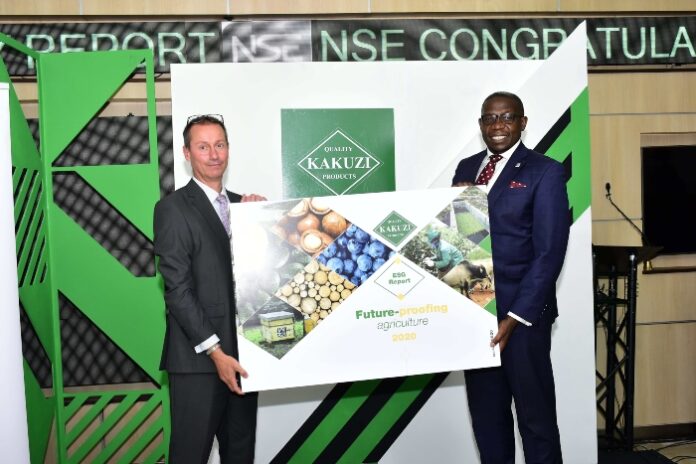Listed agri-business firm Kakuzi Plc has become the first agricultural counter player at the Nairobi Securities Exchange (NSE) to release its Environmental, Social, and Governance (ESG) report today.
The firm, one of the seven agricultural counter players, released its 2020 ESG report as listed firms begin to adopt NSE guidelines requiring the annual publishing of such disclosures.
Speaking at the Kakuzi 2020 ESG Report’s launch, Kakuzi Managing Director Mr. Chris Flowers said the firm had invested more than Kshs 1.6 billion over the last four years to enhance its operations, mitigate governance risks and ensure global standards are maintained.
Late last month, the NSE launched its Environmental, Social, and Governance (ESG) Disclosures Guidance Manual to improve and standardize ESG information reported by listed companies in Kenya.
The latest Kakuzi ESG report aptly titled ‘Future-proofing agriculture’ confirms that, at its Murang’a county-based agricultural production fields, the firm is part and parcel of the surrounding community. On an average day, Kakuzi employs 3,000 people, with more than 5,000 school children attending public school learning facilities within its boundaries. Local suppliers, the report adds, have been servicing procurement opportunities valued at more than Kshs 484 million annually.
At the event graced by NSE CEO Geoffrey Odundo, Kakuzi, Mr. Flowers assured will continue to make critical investments to enhance shareholder value and secure an attractive return on investment as part of the firm’s ESG excellence pursuit.
“This ESG report represents our holistic approach to measuring our Economic, Social, and Environmental impact across our business. The report also highlights our commitment to sustainability and is aligned with the UN Sustainable Development Goals (SDGs) framework,” Mr. Flowers said.
He added: “Consistent with ESG standards, we have put money and human capital resources where our mouth is, and have over the last four years paid out over Kshs 900 million in dividends to our 1,300 shareholders and Kshs 260 million to smallholder avocado farmers.”
Kenya’s 6 billionaires who all come from one village
The Agriculture sector, Mr. Flowers noted, contributes 35% of the national GDP and remains a significant employer. With increased investments, the country, he said, had earned an estimated US$ 1.3 billion from horticulture, surpassing an estimated US$ 1 Billion earnings from tea.
He stressed that operations from agricultural economic activities will need to be closely monitored to avert climate change-related risks. “Through climate change, we are now faced with one of the most significant threats to our World, and we as agricultural business leaders have a pivotal role to play,” Mr. Flowers said.
Agricultural engagements, he added, must go beyond being carbon net-zero and have a positive contribution to climate change. We must become Carbon Positive.
As per the tenets of ESG reporting, Kakuzi has adopted a broader outlook on sustainability matters beyond climate action. The firm, he confirmed, is actively adhering, monitoring, and making ESG disclosures.
Among other ESG compliance factors, Kakuzi, he reiterated, was the first Company in Kenya, if not East Africa, to implement an Operational Level Grievance Mechanism (OGM) aligned to the UN Guiding Principles of Business and Human Rights. This process, known as SIKIKA, ‘be heard’, is designed to address any grievances in a transparent, credible, legitimate, and, where appropriate, independent manner.
Kakuzi is also the first organization in sub-Sahara Africa to establish a functional Independent Human Rights Advisory Committee (IHRAC). The Kakuzi IHRAC is Chaired by former Attorney General Prof Githu Muigai and underscores the firm’s commitment to maintain and uphold human rights as part of its agri-business excellence pillars.
The report outlines a broad scale of corporate social investment programs from sanitation and water for schools to health and social welfare programs, focused primarily on girls and women. The firm’s latest Jiko Kisasa initiative has constructed over 300 energy-saving stoves within the surrounding villages and aims to reach 1,200 by 2023.
According to the NSE and following the recent publishing of ESG reporting guidelines, listed companies will soon be required to report publicly, at least annually, on their ESG performance through an integrated report or a separate sustainability report. This is intended to encourage uniformity in ESG disclosures even as a comprehensive ESG legal framework is awaited.
Listed companies currently have a grace period of one year from the November 2021 issuance of the NSE ESG guidelines to interact and familiarise themselves with the reporting steps. The NSE and the Capital Markets Authority (CMA) are discussing the possibility of launching an ESG index in the future. ESG indices are designed to support common approaches to ESG investing and help investors more effectively benchmark ESG investment performance and manage, measure, and report on ESG mandates.








